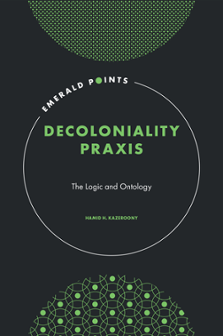Decoloniality Praxis: The Logic and Ontology

Synopsis
Table of contents
(10 chapters)Abstract
This chapter outlines the underpinning author’s perspective to explain the approach to decoloniality and untangle the current praxis and research method from coloniality. This chapter also describes the subsequent chapters’ structure, moving from colonialism and its roots to decoloniality in practice and research.
Abstract
Chapter 2 offers examples of colonial and neocolonial working throughout history. This chapter defines and provides an overview of colonialism’s development and its economic and administrative roots. This chapter is intended to contextualize colonialism rather than explain its complete history.
Abstract
This chapter reviews the nuances of colonialism, exploring the role of Arab expansion, the inter-African slave trade system, the Christianity position on slavery, similar slavery systems in Asia and Europe, and the impact of colonization after 1400. Using the historical examples of African colonization and its growth into international trade through time, I will examine the scars of colonialism.
Abstract
This chapter examines the changing nature of colonialism through time and the rise of postcolonialism as a Western metaphorical conjuncture declaring the end of colonialism. This chapter also reviews and examines the effects of imperialism’s rise and rivalry on colonialism and coloniality.
Abstract
This chapter reviews postcolonialism praxis. Based on the examination of postcolonialism practices, this chapter details why postcolonialism offers nothing different than colonialism despite administrative and bureaucratic changes when colonizers left the colonized territories physically.
Abstract
This chapter reviews identity, culture, and Indigeneity, examining indigenous research pathways as a decolonizing research method. In this context, the chapter explores indigenous research challenges. It explores phenomenology of practice, reflexive ethnography, and grounded theory as possible research methods to advance indigenous studies and help decolonize research methods.
Abstract
This chapter reviews different ontological positions and uses modernism, postmodernism, structuralism, and poststructuralism to illustrate how each changes the nature of research when attempting to decolonize the research method.
Abstract
Chapter 8 engages in a round table discussion with Montesquieu (Persian Letters), Fanon (Black Skins, White Masks, Dying Colonialism, and the Wretched of Earth), and Camus (The Stranger) posthumously. This chapter explores the inner psyche of the subalterns as they strive to reach decoloniality. This chapter offers suggestions for decolonizing praxis.

- DOI
- 10.1108/9781802629514
- Publication date
- 2023-10-04
-
- ISBN
- 978-1-80262-952-1
- eISBN
- 978-1-80262-951-4